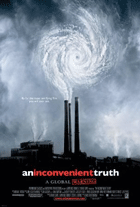
Director: Davis Guggenheim
Duration:100 minutes
Year: 2006
Key words: Climate change, energy
Summary:Al Gore examines the causes and effects of global warming.
Degree of public health theme coverage: This documentary is not directly related to public health but there are many aspects of climate change that could have massive impacts on health. The ones that are discussed include: floods, storms, droughts (with food security issues), water supply, ecosystem disruption and environmental refugees. There is some brief coverage of infectious diseases eg, malaria, West Nile virus (but some of the diseases mentioned have no clear link to climate change eg, SARS, pandemic influenza). There is interesting use of “tobacco farming” and “tobacco use” as metaphors for the slow diffusion over time of scientific knowledge into appropriate personal responses and public responses.Score=4/5
Sophistication of analysis of public health content:The analysis is very sophisticated compared to most documentaries. There is a wide range of data presented on the evidence for climate change occurring and counter views is also examined. Graphical data are frequently presented. Many experts are cited. Nevertheless given the size of the subject some areas are a bit superficial and are even slightly wrong (or have become a bit out-of-date in the subsequent time).Score=5/5
Potential for empowerment and use of advocacy:The movie provides numerous examples of skilled advocacy techniques used by Al Gore: eg, his doing over 1000 presentations around the world. He also has visited key sites at the frontier of the climate change. When working as a politician he also shows examples of his advocacy for responding to climate change. The end of the movie provides examples for personal action on climate change and is fairly upbeat about the scope for societal action (with other major social changes being cited eg, women getting the vote, the end to apartheid etc). Gore also cites US leadership on the response to the ozone hole problem. The website listed at the end provides additional information.Score=5/5
Persuasiveness of the movie: The documentary nature contributed to this film's plausibility along with the overall depth of the analysis and range of data presented. Gore seemed very credible given he has been considering this issue for a long time, had some science training himself and has personal networks that include many key scientists. Since the movie he has also won a Nobel Peace Prize (in conjunction with the International Panel on Climate Change).Score=5/5
Engagement & cinematic quality:The movie was engaging with high quality visual images (photographs and graphs). There was a little bit of humour (though the cartoon near the beginning might seem a bit silly to some people). The stunt of Gore going up in the cherry picker beside the graph is clever. However the style is perhaps a little too didactic and some people might not like the personal touches from Gore's life.Score=4/5
Total score = 23/25
Questions for discussion:
- Is the diagnosis that climate change is occurring convincing from the material presented in this movie?
- Are the solutions by Gore at the end of this movie realistic?
Other information:
- There is an official website on this movie - found here
- There is also a Wikipedia article on it - found here
- The trailer can be seen on YouTube - found here
- Back to Films in Undergraduate Public Health Teaching home page
CONTACT US
Associate Professor Nick Wilson
Department of Public Health
University of Otago, Wellington
PO Box 7343
Wellington South 6242
New Zealand
Tel: +64 4 385 5541 ext 6469
Fax: +64 4 389 5319
Email: nick.wilson@otago.ac.nz
